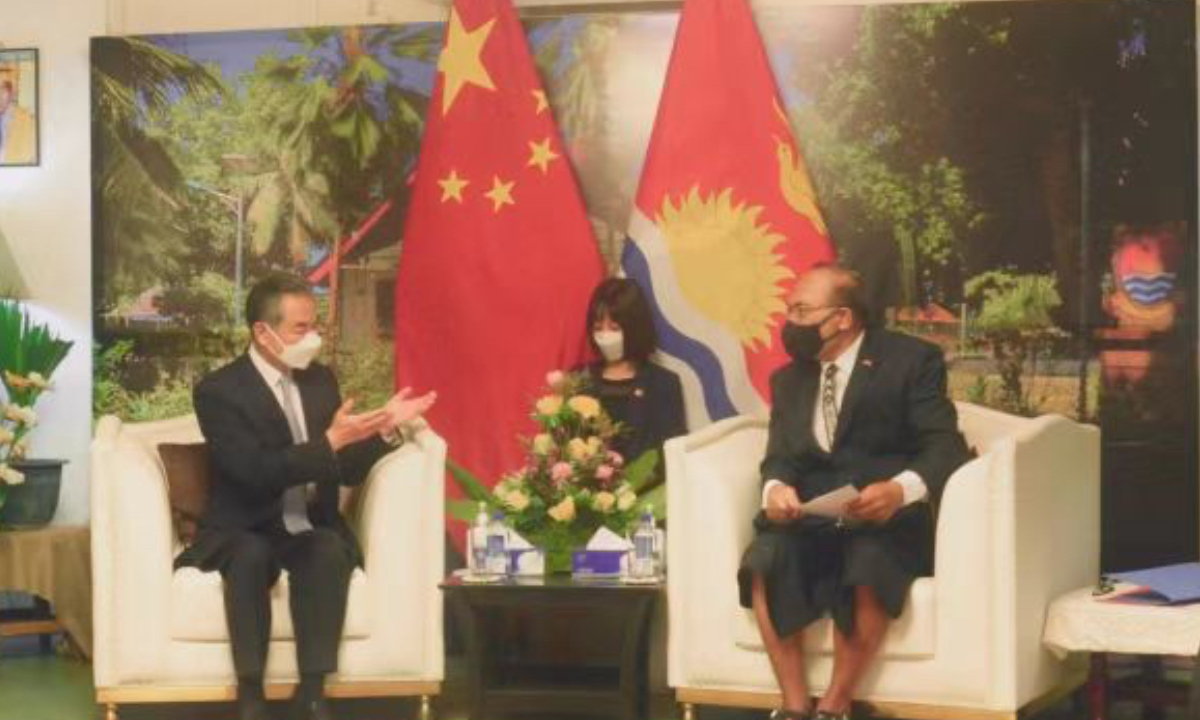
State Councilor and Foreign Minister Wang Yi (left) and Kiribati President Taneti Maamau (right) have a meeting on May 27, 2022. Photo: the website of Chinese Foreign Ministry
Chinese State Councilor and Foreign Minister Wang Yi's visit to the Pacific island countries has led to many important agreements covering various areas, Chinese ambassador to Kiribati Tang Songgen told the Global Times on Tuesday. Tang also said that media hype over China suffering a "setback" from Pacific states not signing up to the proposed security deal shows a colonialist and Cold War mentality, with the potential aim of disturbing the normal cooperation between China and Pacific island countries.
Claims such as "China suffers setback" or "Pacific islanders snub China" are in contrast to the fact that all parties had in-depth communication in a friendly atmosphere and reached a lot of important agreements in politics, the economy, poverty reduction, climate change, anti-epidemic efforts, education and medical care, Tang noted.
Wang's visit to Kiribati, for example, led to the signing of 10 outcome documents, including a cooperation plan under the Belt and Road Initiative, an agreement on economic and technical cooperation, a protocol on sending medical teams to Kiribati, and an agreement on material assistance to address climate change under the South-South Cooperation, Tang noted.
Chinese Foreign Ministry spokesperson Zhao Lijian said at Monday's media briefing that the China-Pacific states foreign ministers' meeting was held successfully, with representatives reaching a new consensus on deepening cooperation. While some foreign media reported that China and the regional countries did not sign a planned joint agreement covering security and trade cooperation at Monday's meeting, Zhao said the joint document is under continued discussion and all parties reached a new consensus, marking an important step toward the final agreement.
The US and Australia have been smearing China's normal cooperation with regional countries since China and the Solomon Islands signed a security cooperation deal.
Kiribati has its own need to work with China in improving its police and law enforcement capability, and China is ready to provide assistance to the best of its ability to help stabilize local society, the ambassador told the Global Times.
"I do not see the urgent need to have a security deal with China. However, it is not wrong to have an arrangement with China for the technical assistance and training of our police constabulary so as to strengthen our future policing and law enforcement capacity to meet the needs of rapid urbanization," Tinian Reiher, a member of the Kiribati parliament, told the Global Times on Tuesday.
Wang's visit to Kiribati was reportedly the first high-level Chinese delegation visit since the resumption of diplomatic ties between the two countries in 2019, with Kiribati attaching great importance to this visit.
Ambassador of Kiribati to China David Teaabo told the Global Times on Friday that the 10 MOUs for development cooperation signed between the two countries during Wang's visit are a "testament to the deepened friendship and strengthened partnership."
"China's cooperation with Pacific island countries has always been conducted in the spirit of mutual respect and equality, and at the request of Pacific island countries. The cooperation projects have been conducive to their development and stability. Some foreign media reports create groundless buzz from the perspective of geopolitics, with the ulterior purpose of disrupting normal cooperation between China and Pacific Island countries," Tang said.
"In fact, this exposes their consistent colonialist mentality and deep-rooted Cold War mentality. Previous erroneous reports by foreign media about 'China building a military base on the island of Kanton in Kiribati' and 'China forced Kiribati to open the Phoenix Marine Protected Area' are fine examples," according to Tang.
The Western media always selectively ignores the repeated clarifications by the Kiribati government, leading to malicious rumors and smears against China, he added.
Tang suggested that the Chinese delegation was warmly welcomed by Kiribati people, which was reflected in the welcome posters at the airport and the national flags of both countries being seen in the street.
The visit did highlight the importance China attaches to the development of the Pacific islands countries including Kiribati based on mutual understanding, trust and cooperation, said Reiher. "For Kiribati, I can say that even though the resumption of our diplomatic ties with China was as recent as 2019, we have already seen the commitment on the part of China to assisting in our search for better livelihoods for our people and pushing for prosperous and sustainable economic development," he noted.
China respects the independent choice of development path and will of Pacific island countries and advocates consultation and consensus. Unlike some Western countries, China will not regard Pacific island countries as its backyard and impose its will on others, Tang stressed.
Fiji Prime Minister Frank Bainimarama posted a tweet on Monday saying that "the Pacific needs genuine partners, not superpowers that are super-focused on power," while recognizing "an excellent meeting with Minister Wang Yi" that led to an agreement on more practical cooperation.
The mechanism of the China-PICs Foreign Ministers' meeting established last October is a new platform for China and Pacific Island countries to deepen exchanges and cooperation and jointly cope with risks and challenges. The second China-Pacific Island Countries Foreign Ministers' Meeting held in Fiji is the first time that the meeting has been held in an island country, Chinese Ambassador to Fiji Qian Bo told the Global Times on Tuesday. It also bears witness to the tangible achievements of the meeting in addressing climate change, poverty reduction and development, agricultural cooperation and other aspects.




